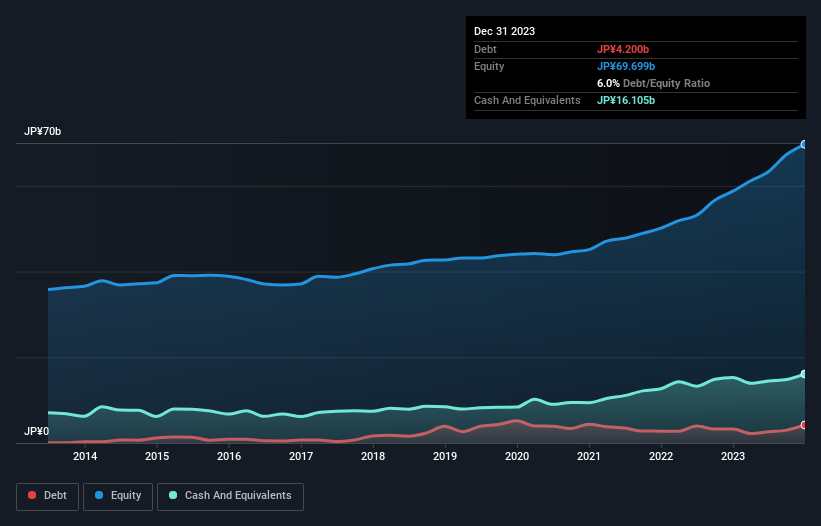Howard Marks put it nicely when he said that, rather than worrying about share price volatility, 'The possibility of permanent loss is the risk I worry about... and every practical investor I know worries about.' When we think about how risky a company is, we always like to look at its use of debt, since debt overload can lead to ruin. We note that Asahi Yukizai Corporation (TSE:4216) does have debt on its balance sheet. But should shareholders be worried about its use of debt?
When Is Debt Dangerous?
Debt and other liabilities become risky for a business when it cannot easily fulfill those obligations, either with free cash flow or by raising capital at an attractive price. Ultimately, if the company can't fulfill its legal obligations to repay debt, shareholders could walk away with nothing. While that is not too common, we often do see indebted companies permanently diluting shareholders because lenders force them to raise capital at a distressed price. Of course, the upside of debt is that it often represents cheap capital, especially when it replaces dilution in a company with the ability to reinvest at high rates of return. The first thing to do when considering how much debt a business uses is to look at its cash and debt together.
Check out our latest analysis for Asahi Yukizai
How Much Debt Does Asahi Yukizai Carry?
As you can see below, at the end of December 2023, Asahi Yukizai had JP¥4.20b of debt, up from JP¥3.26b a year ago. Click the image for more detail. But on the other hand it also has JP¥16.1b in cash, leading to a JP¥11.9b net cash position.

A Look At Asahi Yukizai's Liabilities
According to the last reported balance sheet, Asahi Yukizai had liabilities of JP¥23.3b due within 12 months, and liabilities of JP¥5.27b due beyond 12 months. On the other hand, it had cash of JP¥16.1b and JP¥25.2b worth of receivables due within a year. So it actually has JP¥12.7b more liquid assets than total liabilities.
This surplus suggests that Asahi Yukizai has a conservative balance sheet, and could probably eliminate its debt without much difficulty. Succinctly put, Asahi Yukizai boasts net cash, so it's fair to say it does not have a heavy debt load!
In addition to that, we're happy to report that Asahi Yukizai has boosted its EBIT by 56%, thus reducing the spectre of future debt repayments. The balance sheet is clearly the area to focus on when you are analysing debt. But it is future earnings, more than anything, that will determine Asahi Yukizai's ability to maintain a healthy balance sheet going forward. So if you want to see what the professionals think, you might find this free report on analyst profit forecasts to be interesting.
Finally, a company can only pay off debt with cold hard cash, not accounting profits. While Asahi Yukizai has net cash on its balance sheet, it's still worth taking a look at its ability to convert earnings before interest and tax (EBIT) to free cash flow, to help us understand how quickly it is building (or eroding) that cash balance. Looking at the most recent three years, Asahi Yukizai recorded free cash flow of 24% of its EBIT, which is weaker than we'd expect. That weak cash conversion makes it more difficult to handle indebtedness.
Summing Up
While it is always sensible to investigate a company's debt, in this case Asahi Yukizai has JP¥11.9b in net cash and a decent-looking balance sheet. And it impressed us with its EBIT growth of 56% over the last year. So is Asahi Yukizai's debt a risk? It doesn't seem so to us. There's no doubt that we learn most about debt from the balance sheet. But ultimately, every company can contain risks that exist outside of the balance sheet. For instance, we've identified 1 warning sign for Asahi Yukizai that you should be aware of.
If, after all that, you're more interested in a fast growing company with a rock-solid balance sheet, then check out our list of net cash growth stocks without delay.
New: Manage All Your Stock Portfolios in One Place
We've created the ultimate portfolio companion for stock investors, and it's free.
• Connect an unlimited number of Portfolios and see your total in one currency
• Be alerted to new Warning Signs or Risks via email or mobile
• Track the Fair Value of your stocks
Have feedback on this article? Concerned about the content? Get in touch with us directly. Alternatively, email editorial-team (at) simplywallst.com.
This article by Simply Wall St is general in nature. We provide commentary based on historical data and analyst forecasts only using an unbiased methodology and our articles are not intended to be financial advice. It does not constitute a recommendation to buy or sell any stock, and does not take account of your objectives, or your financial situation. We aim to bring you long-term focused analysis driven by fundamental data. Note that our analysis may not factor in the latest price-sensitive company announcements or qualitative material. Simply Wall St has no position in any stocks mentioned.
About TSE:4216
Asahi Yukizai
Engages in the piping system, resin, and water treatment and resource development businesses in Japan.
Flawless balance sheet established dividend payer.
Market Insights
Community Narratives


